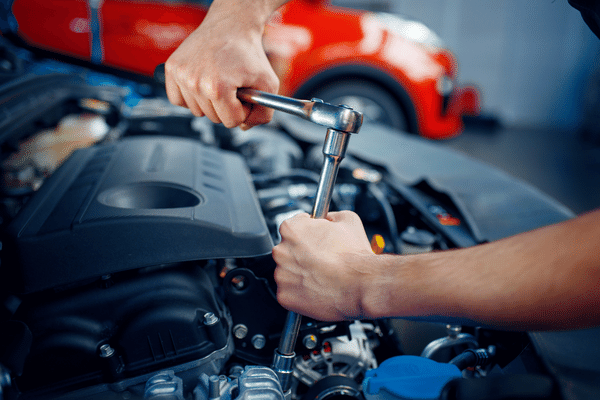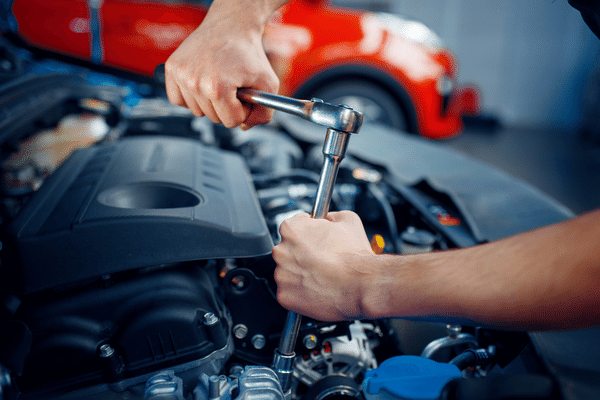Have you ever wondered how to service a car yourself? You’re not alone, the idea of ditching the mechanic for a quick DIY car service is alluring.
Whilst the idea of servicing your car at home is tempting, it can turn out to be expensive, time-consuming and dangerous. However, there are some basic car maintenance tasks you can complete on a regular basis that can minimise the costs of your regular car service.
Advantages of DIY Car Maintenance
Performing some car maintenance at home can have its advantages. By doing regular up-keep with simple and basic maintenance jobs, you can reduce the cost of services and how often your car requires them. These regular check-ups on the workings of your vehicle can also reduce the chance of it unexpectedly breaking down.
Additionally, if cars are one of your hobbies or passions, it can be a great way to learn a new skill. If fixing up cars is something that interests you, consider taking a short course in servicing cars or seeking out guidance from a professional. Building up such skills takes time and shouldn’t be rushed. However, hobbies, money and time should never come at the expense of consulting a licensed mechanic for their expert opinion. Altering certain parts of a vehicle can have an impact on its safety, risking the lives of the driver and those around them. It can also have a significant impact on resale value.
Dangers of DIY Car Maintenance
Whilst the advantages of completing car maintenance yourself may seem appealing, there are potential downsides that could harm your physical and financial well being. If you happen to make a mistake, this could lead to your next mechanical bill being much bigger than it originally would have been. Additionally, investing in the correct tools and equipment to service your car can sometimes end up costing the same amount of money as a regular service. On top of this, for a beginner, certain repairs and maintenance can be time consuming. This is especially relevant if you are learning about cars for the first time, in these instances it can often be worthwhile servicing your car with a mechanic instead.
Additionally, servicing your car yourself could introduce insurance, legal and warranty issues. The technology of modern cars often requires the expertise and knowledge of a licensed specialist. Choosing to not go through these specialists could potentially void your warranty or insurance claims. Before doing any work on your car, be sure to have a good understanding of the conditions of your insurance or warranties.

DIY Car Maintenance
Whilst more complicated maintenance tasks should be left to the licensed professionals, there are a few things you can do to help reduce the costs of your next trip to the mechanic. However, it should be noted that if you are not confident in completing these tasks and make a mistake, doing so could do more harm than good to you and your car. Be sure to do your research, be aware of your own capabilities and ask for professional help when you need it.
Basic car maintenance checks you can perform at home may include:
Changing air filters
Air filters limit the amount of dust, pollen and particles coming into your engine, limiting wear and tear. However, as is the filter’s nature, eventually it will become clogged with dust and dirt. Too much build up can affect the flow of air to the engine, reducing combustion efficiency. These filters can be easily replaced by having a look under the bonnet, finding the air filters, removing them and replacing the filter with a new one. It is always wise to consult the owner’s manual for the correct method on replacing air filters, as it can vary for each vehicle.
Checking your oil and water levels
Your oil and water levels will help your car run smoothly and reduce the likelihood of it breaking down. These levels should be checked on a regular basis. However, changing the oil should be reserved for those with more experience in car repairs. Changing the oil requires a suitable jack, stands/ramps, knowing how and where to jack the vehicle and appropriate disposal of the old oil. For these reasons, do not attempt to replace the oil unless you are a seasoned car repairman.
Caring for windscreen wipers and washers
Regularly clearing your windscreen wipers of any dirt and debris, in addition to regularly topping up the windscreen washer fluid is an easy way to keep your car clean and safe to drive. Try to avoid using your windscreen wipers on a dry windshield, to avoid any scratching. Additionally, be sure to check the state of your windscreen wipers before taking your car to the mechanic, as this is often an additional repair recommendation made that isn’t always necessary.
Testing the handbrake
Find a steep hill, turn on the handbrake and see if it ‘holds’ your car in place. Be sure to have your foot ready to brake, in case there is an issue. Ensure you do this safely, by also choosing a quiet street with minimal traffic and pedestrians.
As mentioned before, it is always best to leave more advanced repairs and maintenance to licensed mechanics. This is especially important for repairs including brakes, steering and suspension. If you alter these incorrectly, you would be putting your life, and the lives of others, at immense risk. Remember, just because you can service your car yourself, does not mean you should service your own car.
Looking to sell your car?
If your current car requires more work than it is worth, consider checking out our other resources on selling cars that require work, or get in contact with one of our friendly team members to chat about how we can help you out.


